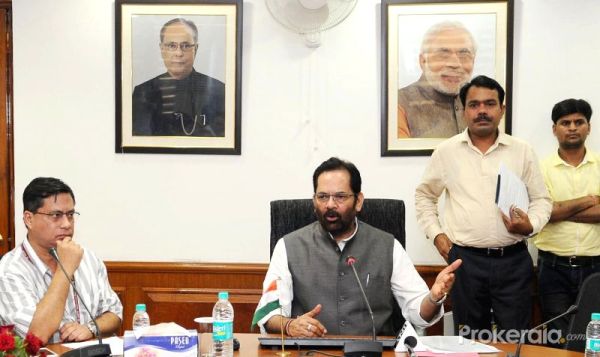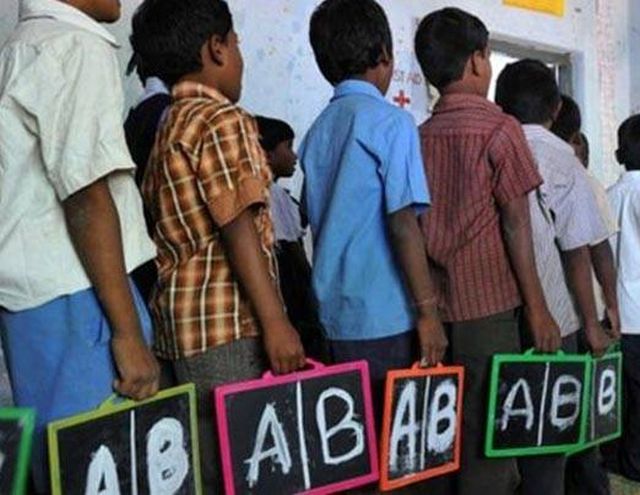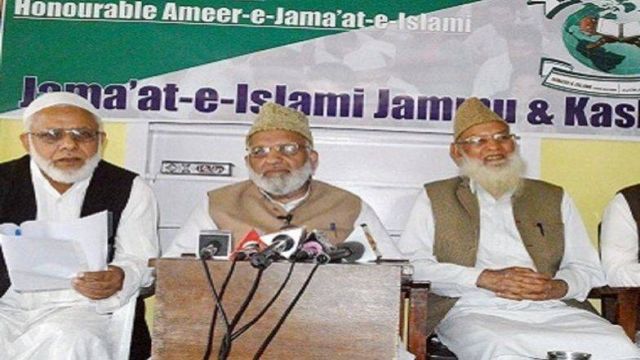
by admin | May 25, 2021 | Corporate, News

Union Minister Mukhtar Abbas Naqvi’s assertions are based on lies. Neither the Jamaat nor the PFI is a political party. Accusing the Congress of allying with “radical organisations like Jamaat-e-Islami and Popular Front of India (PFI)” shows the frustration of the saffron party.
Tejashwi has upset the calculations of the saffron party by raising real issues of employment and development for which the BJP has no answer
Shaheen Nazar | NEW DELHI
Bihar appears to be slipping out of the hands of BJP and its main ally, Nitish Kumar’s Janata Dal (United).
At least, Union Minister Mukhtar Abbas Naqvi’s attack on Congress points towards this fact. Addressing a press conference at BJP headquarters in Delhi on Sunday, Naqvi accused the Congress of allying with “radical organisations like Jamaat-e-Islami and Popular Front of India (PFI)” in poll-bound Bihar and sought to know if RJD leader Tejashwi Yadav and his party are also part of such “an understanding”.
Naqvi’s assertions are based on lies. Neither the Jamaat nor the PFI is a political party. Naqvi has also referred to the Welfare Party of India (WPI), supposedly a front of the Jamaat. But WPI, a small political party formed nine years ago, has no unit in Bihar and it is not contesting any seat or even supporting any party.
PFI’s political front Social Democratic Party of India (SDPI) is participating in the three-phase Bihar assembly elections with the first phase slated for October 28. But again, it has formed an alliance with some smaller parties which are not part of the Mahagathbandhan comprising the Congress, RJD and Left parties.
“For the convenience of the Congress, Jamaat-e-Islami has formed a political party, probably named it Welfare Party,” alleged Naqvi. Welfare Party president SQR Ilyas termed Naqvi’s statement as “frustration” of the Bharatiya Janata Party.
“The BJP appears to be in panic after seeing massive crowds at the rallies of Tejashwi Yadav. The RJD leader has upset the calculations of the saffron party by raising real issues of employment and development for which the BJP has no answer. It has been denied its usual plank of polarising voters along communal lines,” Ilyas said.
BJP’s attack on Congress has come just two days after CPI(M) made a similar charge against the Congress. The Left party’s attack is also related to the election, but it is related to civic body polls in Kerala.
The party, which leads the ruling Left Democratic Alliance (LDF) in Kerala, on Friday accused the Congress of “surrendering” its secular stance before the Indian Union Muslim League (IUML), stating that it is now “led by Jamaat-e-Islami’s ideology”.
The accusation has a background. The Congress-led United Democratic Alliance (UDA) has decided to have electoral adjustments with some smaller parties, including the Welfare Party, for the coming local body elections in the southern state.
CPI(M) Politburo member and party’s state secretary Kodiyeri Balakrishnan told the media that IUML had “strongly opposed” Jamaat-e-Islami in the past. “Now, IUML has abandoned that stand and has no reservations to work with Jamaat-e-Islami, which wants to establish an Islamic country. It is parallel to the stand of RSS, which aims at Hindu Rashtra. The decision of the Congress to work with WPI would have far-reaching consequences,” he said.
Balakrishnan criticised the Congress which, according to him, “has surrendered its secular outlook before IUML for a few votes”.
Interestingly, CPI(M) leader criticised the Congress for aligning with a Muslim party a day after welcoming in the LDF fold the Jose K Mani faction of regional Christian party Kerala Congress (M).
Welfare Party’s Ilyas told Clarion India that his party had had a similar seat sharing arrangement with Left parties in five districts of Kerala in 2015 local bodies election. This had helped the party win 42 seats.
He said seat sharing among political parties was quite normal. According to Ilyas, his party was in negotiation with both Congress and Left parties for the upcoming Assembly elections in West Bengal. “In Kerala, the Congress and Left parties are rivals. But in West Bengal, they are going to fight jointly. And we are going to have some sort of arrangement with both,” he said.

by admin | May 25, 2021 | Corporate, News

Representational Image
New Delhi : Central Educational Board of Jamaat-e-Islami Hind has proposed various suggestions to the HRD Minister for the smooth running of educational institutions and the education system across the country, during the unprecedented time of pandemic.
In a letter to Union HRD Minister Dr Ramesh Pokhriyal, Chairman of the Jamaat’s Central Educational Board Mr. Nusrat Ali has proposed various suggestions after extensive deliberation on the issue by experts to overcome negative impact of COVID-19 epidemic on the education system in India.
Jamaat’s Educational Board has demanded that the government should aid private school teachers from PM CARES Fund or any other relevant scheme. The Board further demanded, “Provident Fund (PF) department/EPFO should give an interest-free loan to the teachers of private schools for three years. The government should offer interest-free loans to small private schools as it has formulated a scheme on the lines of MSME loan.”
The chairman of the Jamaat’s board, in a letter, has suggested the government to evolve a system for home schooling, which has to be regulated and facilitated.
The Jamaat’s board has also demanded that all the State governments in coordination with the Union government should develop an online teaching system. “Online content should be developed by the respective governments. The government should telecast the content on Doordarshan / TV channels and it shall be available online. Those students who do not have a smartphone, the Government should provide them with limited data facility,” it added.
The Jamaat’s board has recommended to allocate 60% of the Corporate Social Responsibility (CSR) fund to Educational Institutions and Education System in this pandemic situation. “The CSR fund which is being used for development purposes may also be allocated to Educational Institutions and Education System across the country with a ceiling of 60% in this pandemic situation,” it added.

by admin | May 25, 2021 | News, Politics
 By Sheikh Qayoom,
By Sheikh Qayoom,
Srinagar : For Jamaat-e-Islami (JI) Jammu and Kashmir the ban imposed on the socio-political religious organisation by the union government is not the first and perhaps not the last.
The government on Thursday declared the JI Jammu and Kashmir as “an unlawful association whose activities have the potential of disrupting the unity and integrity of India”.
Before imposing the five-year-long ban, more than 250 leaders and cadres of the organisation were picked up by police during nocturnal raids throughout the Valley.
After lodging them in local police stations, many senior leaders of the JI have been shifted to the central jail in Srinagar city.
The Joint Resistance Leadership (JRL), the separatist conglomerate headed by Syed Ali Geelani, Mirwaiz Umer Farooq and Muhammad Yasin Malik, called for post Friday prayer protests against the ban.
The authorities reacted by imposing restrictions in parts of Srinagar city to prevent any protests.
The ban order has been criticised by some mainstream politicians, including former Chief Minister Mehbooba Mufti.
Mehbooba said: “Democracy is a battle of ideas. The crackdown, followed by the banning of Jammat Islami is condemn able and another example of high handedness and muscular approach of the GOI (Govenment of India) to deal with the political issue of J&K”.
Separatist leaders in both the Syed Ali Geelani headed group and Mirwaiz Umer headed Hurriyat group have condemned the ban with one voice.
The authorities have placed Mirwaiz Umer under house arrest while Geelani continues to be under house arrest in Srinagar city.
Muhammad Yasin Malik is also under preventive detection.
JI Jammu and Kashmir is distinct from Jamaat-e-Islami Hind that was founded in 1948 as an Islamic organisation, but finally split into three offshoots in India, Pakistan and Bangladesh.
The founder of the Jamaat-e-Islami Hind, Sayyid Abul Ala Maududi, however, continues to the beacon light for the JI J&K as well.
The JI was first banned in 1975 during the emergency for opposing the Indira-Abdullah accord that finally brought back the National Conference (NC) founder, Sheikh Muhammad Abdullah, into mainstream politics.
The organisation was again banned by the central government headed by V.P.Singh in 1990. That order was revoked in 1993 by the P.V. Narasimha Rao headed Congress government.
JI leaders, including Muhammad Yusuf Shah, who later became the supreme commander of the Hizbul Mujahideen outfit in his new avatar as Syed Salahudin, fought the 1987 assembly elections with other leaders who opposed the NC under the banner of the Muslim United Front (MuF).
It is generally believed that many JI candidates, including Muhammad Yusuf Shah were defeated by a false declaration of results.
Senior JI leader Geelani, however, won the 1987 assembly elections repeating his victories in 1972 and 1977.
Geelani has been a part of the state’s electoral process till the JI decided to say goodbye to mainstream politics after 1990.
Many people believe that the single biggest reason for the JI cadres supporting militancy and separatism was their engineered defeat during the 1987 elections.
After ending their association with electoral politics, senior JI leaders supported the state’s merger with Pakistan, although the JI cadres did not initially pick up weapons to join the armed struggle till militancy took the centre stage in the Valley in 1989.
Since the pro-azadi Jammu and Kashmir Liberation Front (JKLF) advocated an
independent state free from both India and Pakistan, the Hizbul Mujahideen (HM) that had a predominant number of youth belonging to families of JI cadres was formed in September 1989.
HM stands for state’s merger with Pakistan.
After the HM was formed, the official crackdown on JI-run schools and other
organisations involved in fund raising started.
Geelani, who heads his faction of the separatist Hurriyat group, has formed his own organisation called the Tehreek-e-Hurriyat, but continues to wield both respect and influence in the JI.
(Sheikh Qayoom can be reached at sheikh.abdul@ians.in)
—IANS




